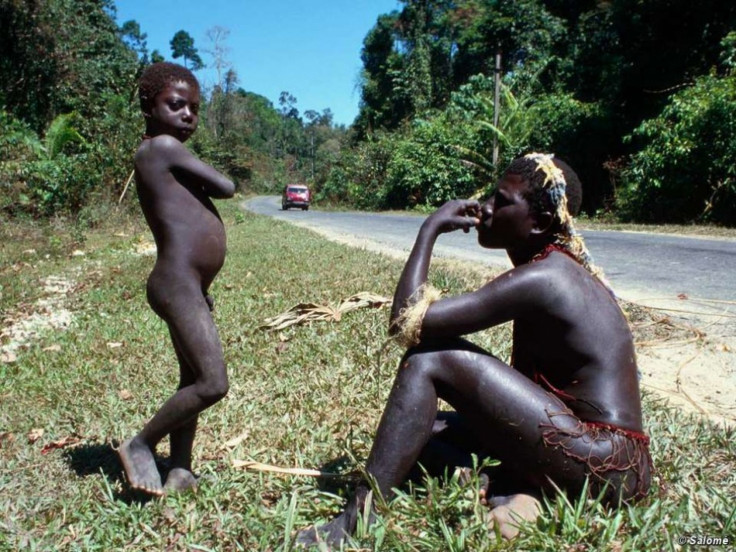Andaman Islands Boycott Seeks End To Jarawa ‘Human Safaris’

The plight of the Jarawa tribe on the remote Andaman Islands made headlines around the world last year when a journalist from the Observer captured video footage of tourists on so-called “human safaris” into the tribe’s reserve. In the unsettling video, tourists were seen tossing scraps of food to the half-naked natives and ordering them to dance for photos.
Politicians across India, which administers the Bay of Bengal archipelago, demanded answers. The Minister for Tribal Affairs called the practice “disgraceful” and “an embarrassment,” while the Supreme Court banned travel along the Andaman Trunk Road, which runs through the Jarawa reserve. Yet, that ban lasted just seven weeks before the Islands’ authorities changed their own regulations to reopen the road. According to tribal rights group Survival International, the human safaris continue to this day.
“The Supreme Court order banning tourists from the Andaman Trunk Road in January was made to push the Andaman Administration to implement its own policy to protect the Jarawa tribe, however this ruling was only interim,” explained Alice Bayer of Survival International.
“After the Andaman administration changed, or “renotified,” the terms of their own buffer zone around the Jarawa reserve to exclude the island of Baratang to the north of the Jarawa reserve, the Supreme Court had no choice but to allow tourist traffic on the ATR to continue as it was no longer in violation of their own rules.”
Bayer said that, while Survival does not have an exact figure on the number of tour operators running human safaris, the organization is certain that “hundreds of tourists” are going through the reserve each day.
“It is now illegal to openly advertise human safaris, but local taxi drivers and tour guides are taking tourists to Baratang Island to the Jarawa reserve and are tempting the tourists with a view to see the Jarawa,” Bayer noted. “After the furor last January, the systems have been tightened making it very difficult for anyone to stop in the reserve and force the Jarawa to dance, as we saw in the video that was released at that time. However, without pressure from the outside it's likely that these most dangerous types of human safaris would start up again.”
After first making contact with "civilization" in the late 1990s, the tribesmen have only recently made tentative steps toward having a relationship with the outside world. Some 400-strong, they are a nomadic people who live in bands of 40 or 50 in the thick forests, hunting pig and monitor lizard and fishing with bows and arrows. Short, dark-skinned and with curly hair, they resemble African Bushmen in appearance and are thought to be among the first to migrate successfully from Africa to Asia.
Calling them one of the most threatened tribes in the world, Survival launched a campaign Tuesday asking the 200,000 tourists visiting the Andaman Islands each year, as well as members of the public, to boycott the destination until foreigners are banned from the Andaman Trunk Road and the government creates an alternative sea route.
Survival wrote over 200 travel companies and websites in 11 countries urging them to stop their tours to the Andaman Islands. Bayer said one company is Spain has already pledged to withdraw its tours, while others have agreed to link to the campaign or display information about the boycott.
Most tourists to the Andamans come from mainland India, while Americans, British and Israelis represent the largest number of foreign visitors.
India has laws designed to protect its indigenous groups susceptible to outside influence. Photography or coming into contact with the disease-prone Jarawa is, by law, illegal, though visitors allegedly trespass on their reserve each day.
Locals have long downplayed any tribal issues on the islands. Senior Andaman policeman Shamsher Bahadur Deol noted when the scandal broke last January that police had made over 1,000 arrests of people attempting to make contact with the Jarawa, but added that “it’s impossible for them to catch everyone.” Indian officials and tribal advocates, meanwhile, believe the police are complicit in allowing the tours to continue.
When Survival first encountered the practice of human safaris in 2010, it coerced four tour operators into discontinuing their trips into the reserve. Working with a local organization, Search, Survival distributed leaflets to tourists arriving at the islands' airport describing the dangers of using the Andaman Trunk Road. Yet, the practice continued.
The tribal rights group hopes its latest campaign demanding an all-out boycott can once and for all put an end to human safaris in the Andaman Islands.
© Copyright IBTimes 2024. All rights reserved.






















